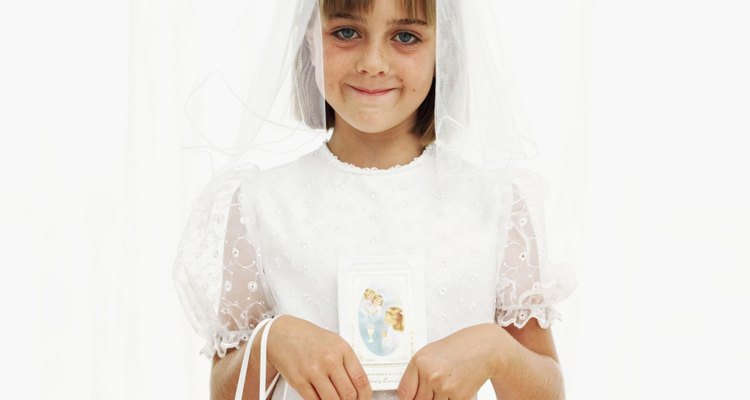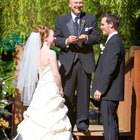More Articles

George Doyle/Stockbyte/Getty Images
First Communion is a big day for Christian children, many of whom spend several years preparing for this important religious rite of passage. Catholic and Protestant children receive First Communion between ages 7 and 12, depending on each church's procedures. This sacrament is highly valued, and friends and relatives often anticipate the church ceremony and traditional gathering afterwards. Although First Communion parties are usually intimate affairs, close friends and family should be welcomed to join you in celebration.
Guests Who Are Not Members of Your Church
If your child has close family members or friends who are nonreligious, or who do not attend your church, they will usually still be welcome to attend the ceremony. Let your officiant know how many nonmembers you plan to invite, so he can make sure there is enough room for the guests of all the children who will be receiving First Communion that day. When preparing invites for guests who do not belong to your church, make sure to include the name and address of the church. Clear directions or a map printout may be helpful. List the time and location of the celebration that will be held afterward, since some guests may choose to skip the church ceremony and give well wishes at the party. If your officiant requires a headcount, ask guests to RSVP for both the ceremony and the party, or follow up with them to see if they plan to be at both events.
Your Child's Friends
First Communions are typically not events to which a child's entire class should be invited. Pare your child's list of invitees down to only her closest friends. These guests and their parents should be sent an invitation by regular mail. You may also choose to invite friends whose families attend your church to join you in celebrating after the ceremony. Since most churches have groups of children that are close in age take First Communion on the same day, you may consider a group celebration after the ceremony, either at the church or another venue. If you agree to this, however, you should be prepared to give gifts to all the children being honored.
Family Members
In most cases, extended family does not need to be invited to a first Communion, unless there are some individuals with whom the child is particularly close, or who have impacted the child's religious development. Godparents, grandparents, siblings and close aunts, uncles and cousins should be invited to the church ceremony and party afterward. Divorced parents should consult with each other to make sure close step-relatives are also included.
Invitation Wording
Invitations do not need to be formal. An upbeat tone will set the mood for the event. For example, your invitation may read: "Share our joy as we celebrate the First Holy Communion of our daughter," followed by your daughter's name, times and locations for the ceremony and party, and RSVP information. Avoid listing any requests for guests to bring or not bring gifts. Gift registry information is usually not considered appropriate for First Communions, and most guests will follow tradition by bringing a small, religious gift.
Related Articles

How Do You Address Wedding Invitations ...

How to Write a Sample Wedding Program

How to Get Married with a Justice of ...

Do the Groom's Parents or Bride's ...

Requirements for Getting Married in a ...

How to Hire a Wedding Priest

Wedding Etiquette for a Widow's Second ...

Does the Mother of the Groom Get ...

Who Gets Invited to a Wedding Rehearsal ...

How to Start an Itinerant Ministry

What Are the Duties of the Groom's Aunt ...

Wedding Etiquette for a Pastor

Quinceanera and Chambelan Outfit Ideas

How to Coordinate a Wedding Ceremony

How to Get Married in the Episcopal ...

Jewish Baby-Naming Ceremony Etiquette

Responsibilities of the Groom's Parents ...

How to Word a Co-Ed Baby Shower ...

How to Address Informal Wedding ...

How to Book a Church Wedding
Writer Bio
Marissa Meyer has been writing professionally since 2004, with work published on websites such as Decoded Science and MomSquawk. She has also worked in the travel, beauty, home design and childcare fields. Meyer received dual Bachelor of Arts degrees in communication and political science from University of Wisconsin-Green Bay.
Photo Credits
George Doyle/Stockbyte/Getty Images